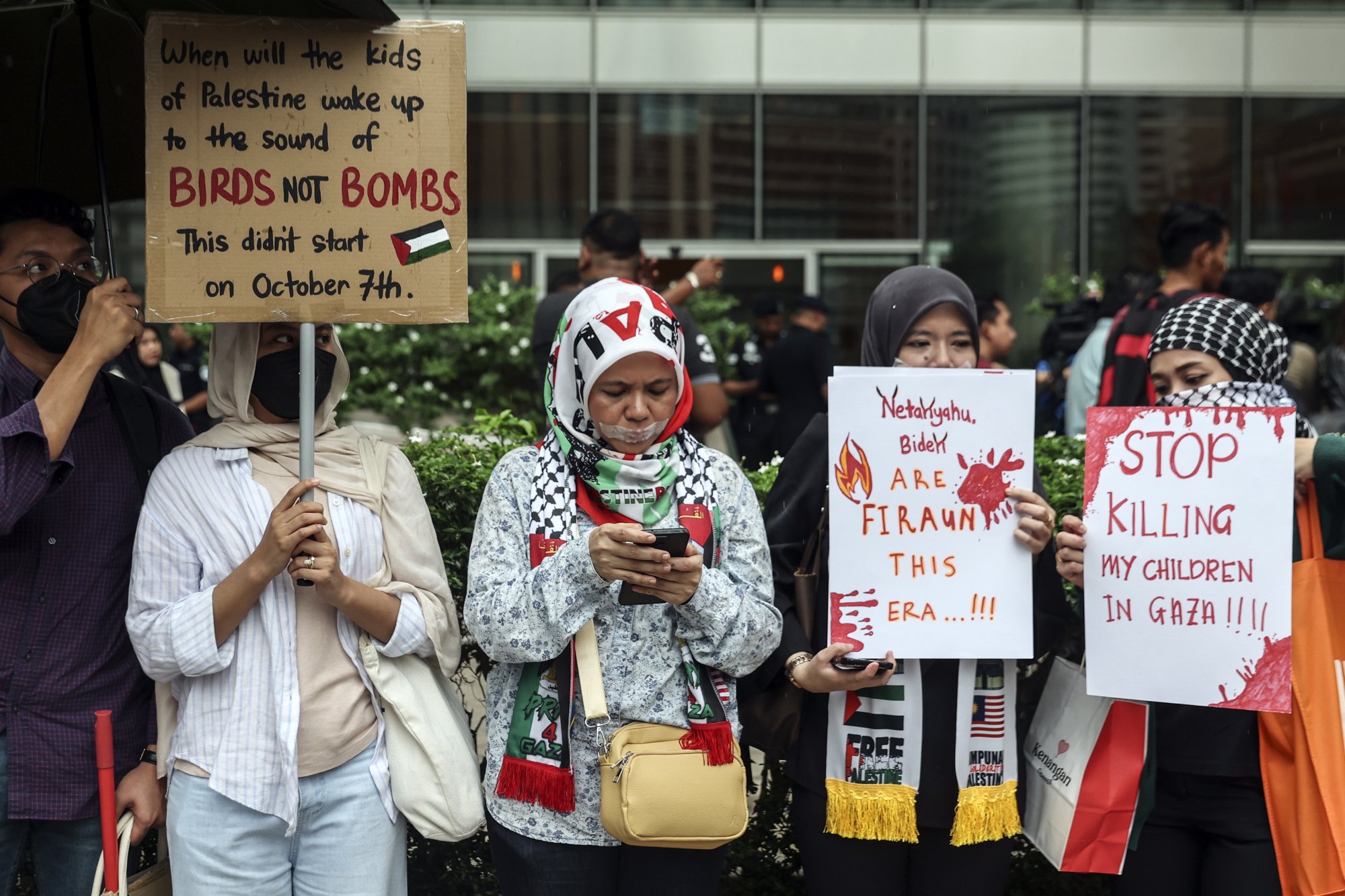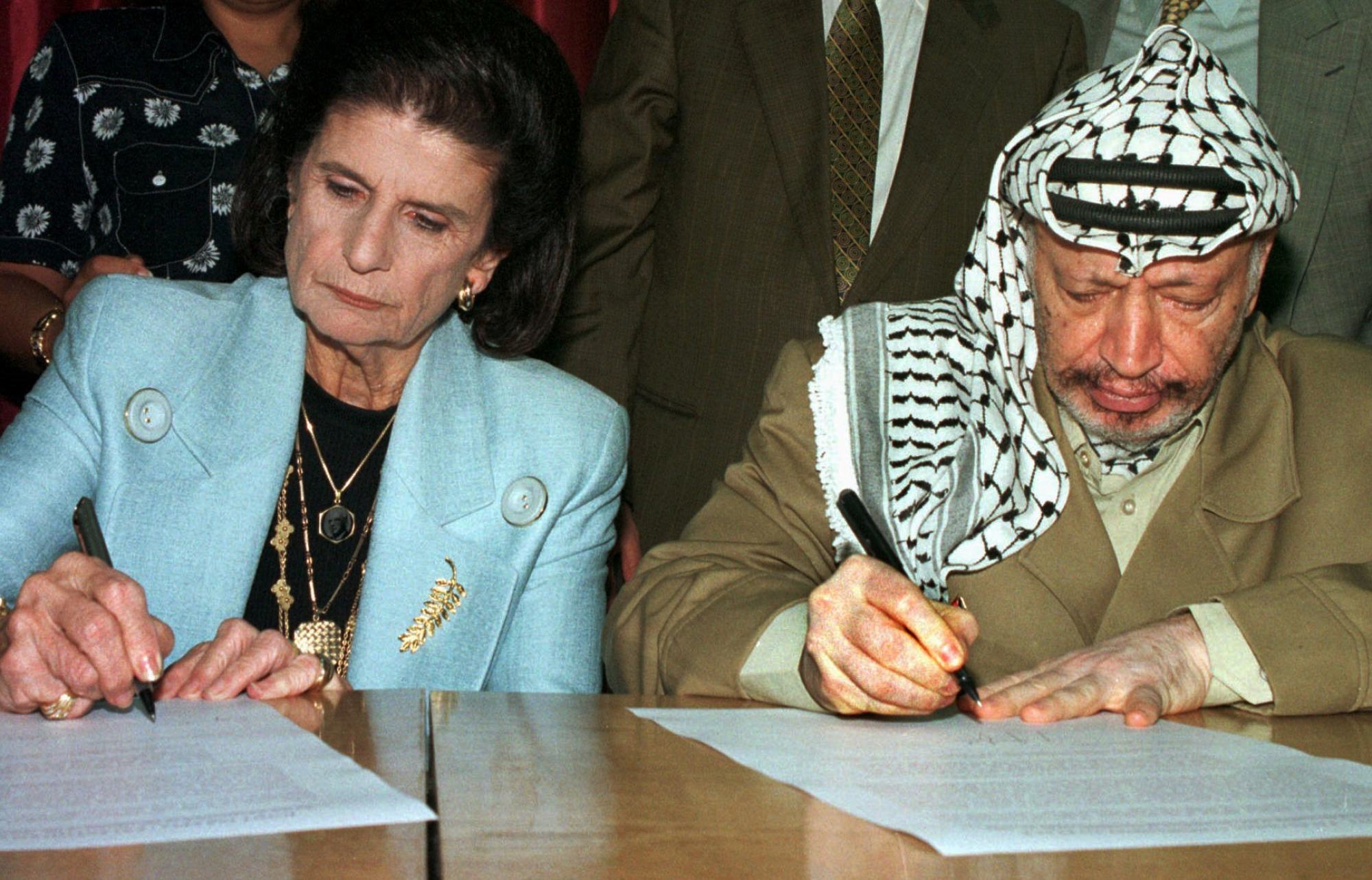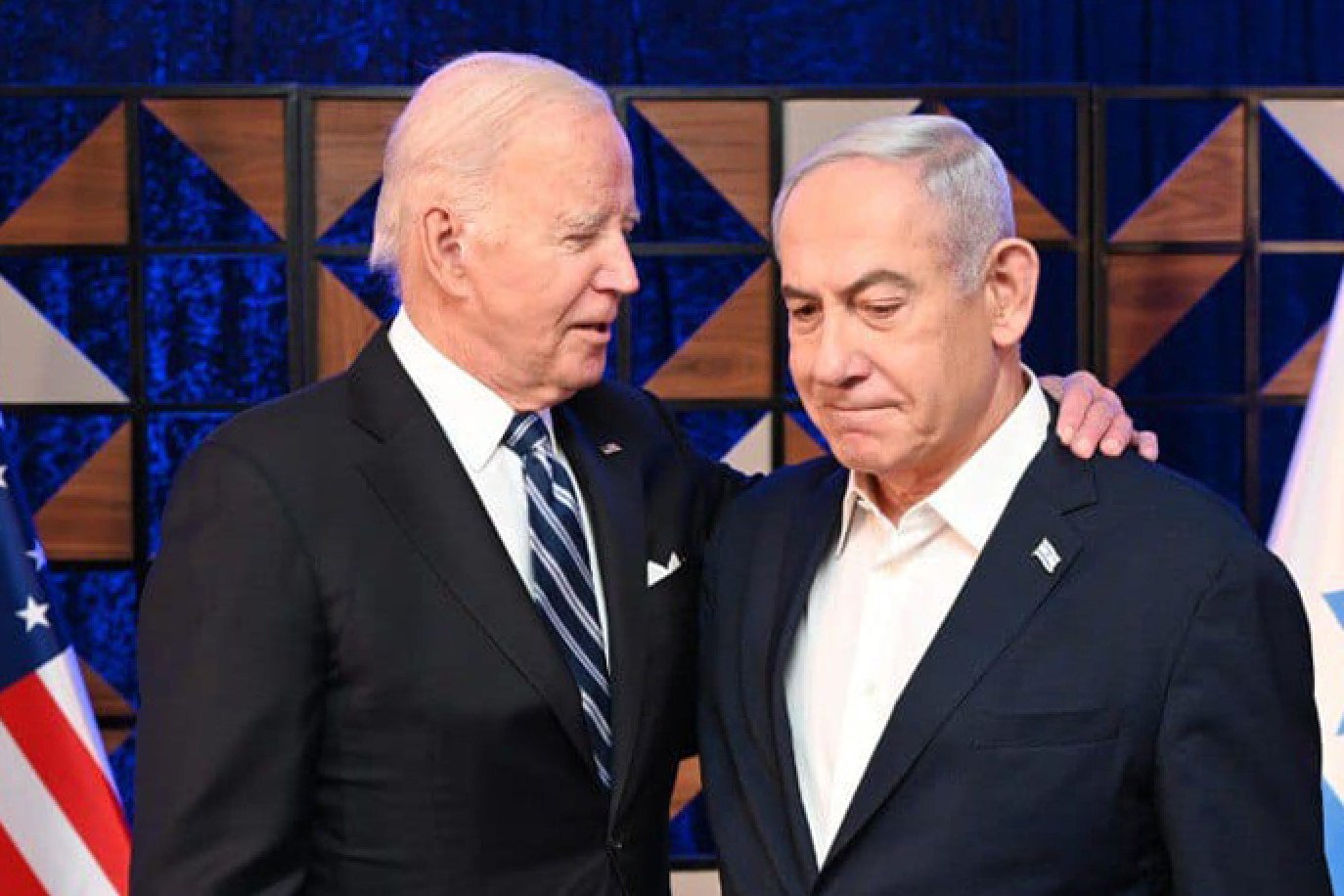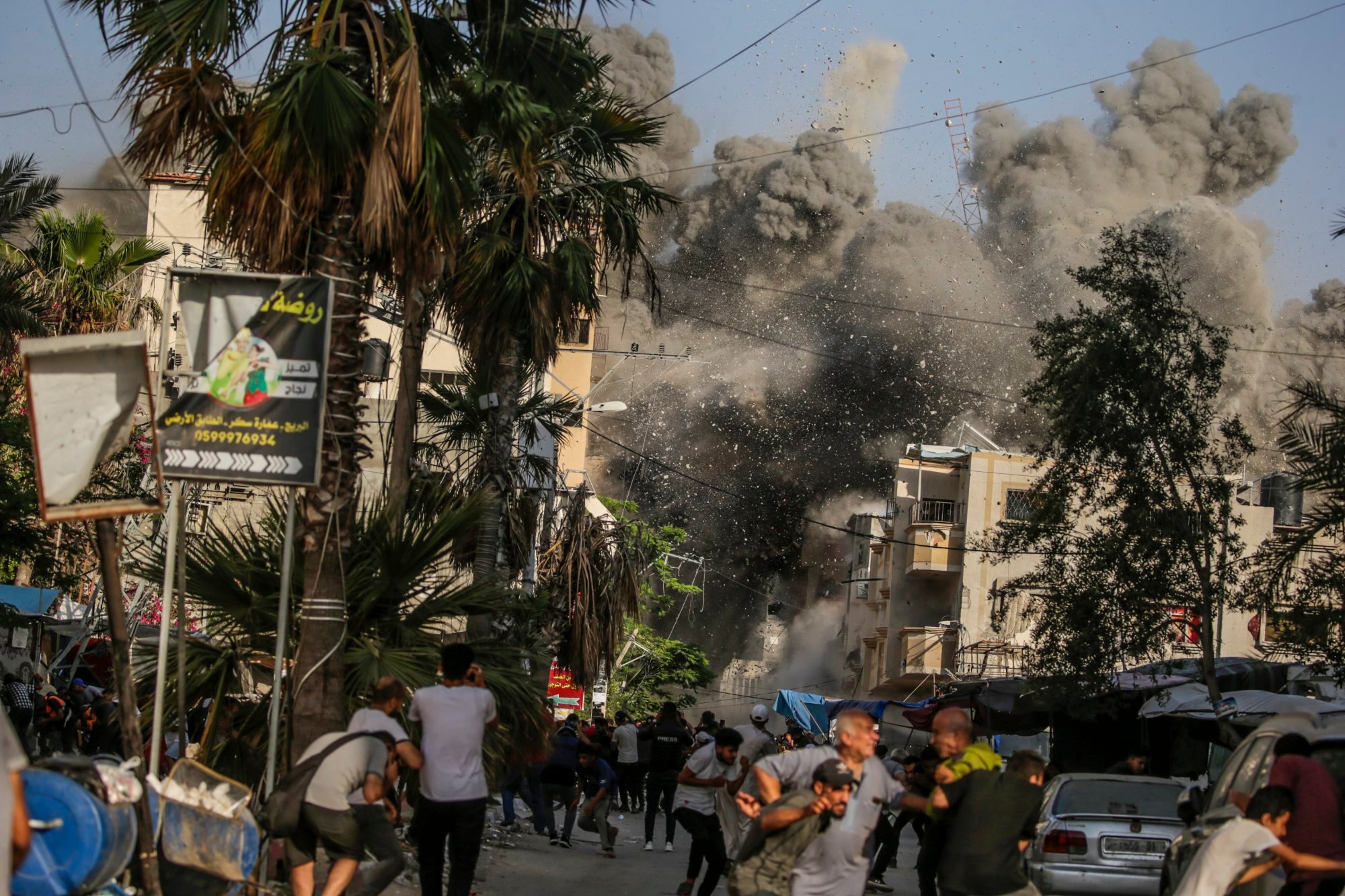Now, he criticises his old friends for backing Israel’s assault on Gaza – even risking being seen as a Hamas apologist after the group’s deadly October 7 attack that sparked the war.
His stance has strained ties between Malaysia and the US, a key trade and investment partner. But analysts say it reflects Anwar’s long-standing personal support for Palestine, which took root during his days as a student activist in the 1970s.
Malaysia’s diplomatic campaign to shame Western capitals into reining in their Israeli ally has now hit a ceiling, however, and Anwar says only the US wields sufficient clout to tell Israel to stop the war.
“The atrocities continue. We have done the maximum of what a small country can do.”
From the outset, Malaysia has made clear its opposition to a conflict that has claimed more than 37,000 lives so far, according to Gaza’s Hamas-controlled health ministry, and displaced over 2 million Palestinians.
Israel has vowed no let up on its assault until it wipes out the group responsible for killing around 1,200 people on October 7 and taking some 250 others hostage.
Malaysia is among the handful of countries that refuse to formally recognise Israel, although the Southeast Asian nation has conducted limited trade with the Middle Eastern power.


Political and personal
Anwar’s ties to Palestine long predate his tenure as Malaysia’s prime minister.
As a founding leader of the Malaysian Islamic Youth Movement (ABIM), he championed the Palestinian cause at public rallies during the group’s heyday, helping elevate it to a national priority for Malaysians, especially the Malay-Muslim majority.
In 1983, Anwar represented Malaysia at the Palestine Liberation Organisation (PLO) summit in Algiers, where then-Palestinian leader Yasser Arafat declared him a “son of Palestine” in honour of his support for their struggle.
“Understanding his background in ABIM, he has always been wholeheartedly on the Palestinian side,” said Syaza Farhana Mohamad Shukri, head of the political-science department at the International Islamic University of Malaysia. “So this is not for [domestic] political purposes per se.”

But Azmi Hassan, a fellow at Malaysia’s National Council of Professors, said the domestic political payoff would be limited, since most Malaysians expect their prime ministers to speak out for Palestine regardless.
The more consequential benefit, he said, is the unique window Anwar’s close ties with the leaders of Hamas in Gaza and Fatah in the West Bank could provide to help end the conflict.
“This is possible because of Prime Minister Anwar’s close relations with Hamas, which not many Arab countries have.”
The militant group had initially expressed willingness to reach a deal, before reportedly responding with a list of proposed amendments including the withdrawal of Israeli forces and the release of Palestinian prisoners in Israel.
White House National Security Adviser Jake Sullivan said on Wednesday that in Washington’s view, “the time for haggling is over”.
Israel, which has not relented in its months-long assault on Gaza despite the ceasefire talks, characterised Hamas’ response as tantamount to a rejection of the deal.
The colonisation of the last 70 years … the killing and dispossession of people’s land, has been continuing long before Hamas was born
Anwar rejects the notion that Hamas alone is responsible for the conflict, calling such claims “absurd”. He notes that Palestinians have endured decades of occupation, dating to 1948 when Zionist forces seized much of the territory surrounding Gaza and the West Bank and declared Israel’s independence.
“The colonisation of the last 70 years, the escalation [of violence] … in the West Bank, the killing and dispossession of people’s land, has been continuing long before Hamas was born,” he said.
“Why do you erase that part of history, [of what happened] pre-October 7 and post- October 7? That has been my contention.”
Hamas first rose to prominence in the late 1980s during the first Intifada – Arabic for uprising – after rejecting the Oslo Accords peace plan with the PLO, choosing instead to pursue a Palestinian state to replace Israel.

In 1997, the US State Department designated Hamas a terrorist organisation after the group carried out a series of deadly suicide bombings in Tel Aviv and Jerusalem that killed more than 20 people and injured hundreds more.

“So don’t be deluded by this constant, incessant propaganda from the Western media.”
Anwar said that he does not interact with Hamas’ militant arm, but described the group as “freedom fighters” and said he has been in communication with its political wing “for the last many years”.
He said he had held “very frank” discussions about the war with Hamas leader Ismail Haniyeh, whose children and grandchildren were killed by an Israeli air strike during the recent Eid celebration.
“I said, look, I represent a view that you would want an amicable resolution, immediate peace, and the return of the hostages, of course in exchange for peace and the return of thousands of political prisoners in Israel,” Anwar said, surrounded by dozens of books on philosophy and religion in his office library from his own personal collection.

Anwar said Biden’s move to sponsor the recent ceasefire resolution was a “relatively bold step”, but ultimately fell short of meeting the long-held demands of the Palestinians.
He conceded that the world’s Muslim countries had yet to unite as a cohesive force to champion Palestine’s cause.
But he said a consensus exists among disparate groups representing Muslim nations – such as the Arab League and Organisation of Islamic Conference – on demands for an immediate ceasefire; the return of hostages taken by Hamas and Palestinian political detainees in Israel; and respecting and pursuing a permanent two-state solution. These proposals had been received by Hamas, Anwar said.
“But of course this is contingent on the Israelis accepting that they should not continue with the bombing and killings,” he said.
“How can you say, ‘we want peace, we agree with you’, but you continue to kill people? You can’t do that … The intention is clear.”

Anwar remains hopeful for a two-state solution, driven by “the wisdom of people” seeking truth and justice, he said. However, he acknowledged that it will not be easy to bring different groups together to agree, drawing from his experience taking office after a deeply divided national election. That vote saw a conservative shift among the country’s Malay majority, who make up nearly 60 per cent of the 33 million population and backed a formidable nationalist minority bloc in parliament.
This trend mirrors developments worldwide, from the revival of fascism in Europe to the rise of extreme right-wing movements in the US, he said.
“I am realistic enough to accept the fact that issues dealing with the race card and religious bigotry is not an easy issue to contend with … but it requires not only tenacity but also wisdom in dealing with the issue,” Anwar said.
Despite these challenges, Anwar believes the fiscal reforms implemented by his multiracial government – including targeted aid for the poor – have started to turn the conservative tide among Malaysia’s Malay majority. He expressed cautious optimism this momentum will continue through the end of his term in 2028.
“It stems from my belief that as human beings, there must be humanity, there must be human values, there must be compassion and justice,” he said.

